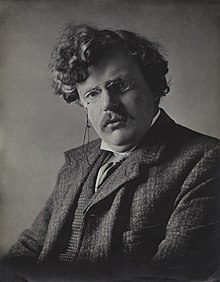G.K.Chesterton
| G. K. Chesterton | |
|---|---|

G. K. Chesterton, by E. H. Mills, 1909
|
|
| Born | Gilbert Keith Chesterton 29 May 1874 Kensington, London, England |
| Died | 14 June 1936 (aged 62) Beaconsfield, Buckinghamshire, England |
| Resting place | Roman Catholic Cemetery, Beaconsfield |
| Occupation | Journalist, novelist, essayist, poet |
| Citizenship | British |
| Education | St Paul's School |
| Alma mater | Slade School of Art |
| Period | 1900–1936 |
| Genre | Essays, Fantasy, Christian apologetics, Catholic apologetics, Mystery, poetry |
| Literary movement | Catholic literary revival |
| Notable works | The Napoleon of Notting Hill (1904), Charles Dickens: A Critical Study (1906), The Man Who Was Thursday (1908), Orthodoxy (1908), Father Brown stories (1910–1935), The Everlasting Man (1925) |
| Spouse | Frances Blogg |
| Relatives | Cecil Chesterton (brother) |
|
|
|
| Signature |  |
Gilbert Keith Chesterton, KC*SG (29 May 1874 – 14 June 1936), better known as G. K. Chesterton, was an English writer, poet, philosopher, dramatist, journalist, orator, lay theologian, biographer, and literary and art critic. Chesterton is often referred to as the "prince of paradox".Time magazine has observed of his writing style: "Whenever possible Chesterton made his points with popular sayings, proverbs, allegories—first carefully turning them inside out."
Chesterton is well known for his fictional priest-detective Father Brown, and for his reasoned apologetics. Even some of those who disagree with him have recognised the wide appeal of such works as Orthodoxy and The Everlasting Man. Chesterton routinely referred to himself as an "orthodox" Christian, and came to identify this position more and more with Catholicism, eventually converting to Catholicism from High Church Anglicanism. George Bernard Shaw, his "friendly enemy", said of him, "He was a man of colossal genius." Biographers have identified him as a successor to such Victorian authors as Matthew Arnold, Thomas Carlyle, Cardinal John Henry Newman, and John Ruskin.
Chesterton was born in Campden Hill in Kensington, London, the son of Marie Louise, née Grosjean, and Edward Chesterton. He was baptised at the age of one month into the Church of England, though his family themselves were irregularly practising Unitarians. According to his autobiography, as a young man Chesterton became fascinated with the occult and, along with his brother Cecil, experimented with Ouija boards.
...
Wikipedia
